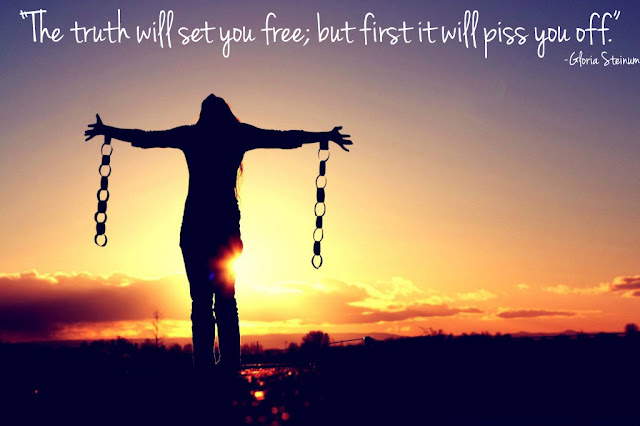Sometimes Our Actions Aren't As They Appear
“The truth will set you free; but first it will piss you off.”
-Gloria Steinum
I love how our actions aren’t always how they appear. I watched a show last night where one of the main characters, certainly a flawed individual as are we all, spoke about an event that happened in his life which shaped him. He spent years afterwards protecting his daughter from knowing a truth, which he felt would be too hard on her, and he took the blame. This was a great cost to him. He let everyone believe that he was responsible for something instead of having his daughter know that his wife, her mother, had an affair. Many of us have done things and said things which aren’t really true in order to protect ourselves or someone else. I see how over time, these lies and partial truths really do not help.
Even though my father was a very flawed man, he told me a story, which touched me deeply and reminds me of the man in the show, a detective Carver from the show, Gracepoint. In my father’s case, he made a decision which other’s never understood, and which caused them to have bad opinions about him. His decision wasn’t a complete secret, for the important players, his “uncle” and his “uncle’s” son knew the truth, but no one else did.
When my father was a teenager his mother’s best friend’s husband befriended him. We called him Uncle Harry. He would take dad to baseball games, which they both dearly loved, and he would go to all of my dad’s games. He even talked my dad’s father into going to one of his basketball games. When dad was a teenager he became a member of a Chicago south side gang and Uncle Harry was concerned about that. He tried to get dad involved in other things and move away from the gang. Although it didn’t work, dad loved his help and support. Uncle Harry had four boys of his own. Even so, he was more involved with dad than he was with his own sons. Harry’s oldest boy became a momma’s boy, too close to his mother, and the second boy became a lot like his father in that he carried Harry’s anger. Harry could be mean and corrupt. This second son was becoming like that, felt himself rejecting his dad and becoming suicidal, and didn’t want to do either. He wanted to be able to love his dad.
As a young adult this man came to dad asking him for help. He told dad that if anyone could help him to love his father, my father could. He felt if he didn’t get help he would kill himself. My father realized that in order for him to be able to help this man, he would have to not need Uncle Harry himself, and didn’t know if he could do that. He soon realized he could and knew that he couldn’t have anything to do with Uncle Harry again in doing this. He took Uncle Harry aside and told him he needed to give him two hours to hear him out and not say anything. This left both men in tears, but Harry knew that dad was giving him his own son back. So my father helped this man who did in fact learn to love his father, and today is still doing well. When Harry was close to dying, they wanted dad to come out and see him, and he felt he couldn’t do that. No one understood why he couldn’t be there for Harry at the end except him, my mother, and Harry’s son. He felt good about giving back, but at a great sacrifice.
We don’t know how our actions appear to others. Only we can know. Secrets can be deadly, and can at times be helpful. Only we truly know and are responsible for our actions. If we stopped judging others and in doing so, stop judging ourselves, we would be able to love us and that love would impact the world. Our inner movements and our own clarity regarding them is what is most important for us to live whole, happy and healthy lives.
Small Lifestyle Changes that Promote Big Results:
Take out a piece of paper and writing utensil. Give yourself up to 15 minutes for this exercise. Write out an event that happened in your life, for you or for someone you know who is close to you in which you were affected, in which you questioned their actions or your own actions. Write out what happened, your thinking process involved in your actions, or what someone’s actions seemed like and how they affected you.
Next, write what might be underneath those actions. What caused you to respond the way you did that on the surface could look so different to someone else? We hear the trite sentence; you can’t judge a book by its cover. What is that sentence really saying, and does it have merit in your situation? Does this help you to see other’s with a slightly different lens? I would love it if any of you are moved to share a situation that pertains in your life and what you might learn from it.




Comments
Post a Comment